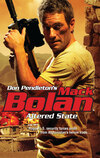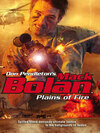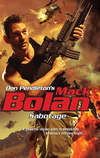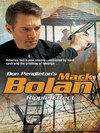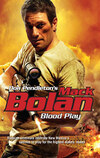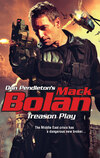Читать книгу: «Altered State», страница 5
CHAPTER FIVE
Park-e-Zarnegar, Kabul
The mausoleum of Abdur Rahman Khan stands in Zarnegar Park, near Kabul’s city center. Once, it was a palace, converted to a vast tomb by the king’s son when Abdur Rahman died in 1901. Its red dome mounted on a white octagonal structure, surmounted by small minarets, still ranked among the finest examples of nineteenth-century baroque architecture in Kabul.
Clay Carlisle loved beautiful things. He had booked the mausoleum for a private tour soon after his arrival in Kabul, but at the moment he had no eye for antiques. His thoughts were focused on the future, both immediate and long-term.
Zarnegar Park was the hub of Kabul, located near Embassy Row, overlooked by the stylish Kabul Serena Hotel and Afghanistan’s Ministry of Communications. None of those features had drawn Carlisle to the park, however. He was not a tourist, and his visit on this fading afternoon was strictly business.
His limousine stopped at a newspaper kiosk on the park’s western boundary. One of Carlisle’s four security guards stepped out of the car and returned seconds later with a new passenger in tow.
The man was fortysomething, with a long face under thinning sandy hair, his slender form clothed in a tailored suit of charcoal-gray. Black wingtips made his feet seem overlarge and heavy. Opaque sunglasses concealed his eyes, which Carlisle knew from past experience were washed-out bluish-gray with a tendency to squint.
“Strange days,” said Russell Latimer, the CIA’s deputy station chief in Kabul.
“Getting stranger all the time,” Carlisle replied. “What can you tell me about our dilemma?”
Latimer cocked one eyebrow behind his shades. “I’m not sure that I’d call it our dilemma just yet.”
“Wouldn’t you?” Carlisle made sure his practiced frown fell somewhere short of hostile. “My mistake, then. As an uninvolved outsider with no future stake in anything that happens to my company, what can you tell me about my dilemma, then?”
“Hold on a second, now.”
“Hold on to what, Russell? Remember what our Lord and Savior said in Matthew 12:30: ‘He who is not with me is against me.’”
“Hey, I’m with you, Clay. All right? I only meant—”
“Don’t tell me what you meant. Tell me what whatever you’ve found out about my problem.”
Sandwiched between two bodyguards who made him look emaciated, Latimer put on a brave face and replied, “You seem a little out of sorts today, my friend.”
“Seeing eleven of my men gunned down has that effect, Russ. Call me crazy.”
“I’d call it normal, in the circumstances. And I’m working on it, but—”
“I hope you’re not about to disappoint me,” Carlisle said.
“That’s never my intention.”
“But you don’t know anything.”
“We have a name, okay? Maybe we have a name.”
“Let’s hear it.”
“Matthew Cooper. He left Baltimore for Paris yesterday, then caught connecting flights to Rome and into Kabul. Had a rental car waiting when he arrived. We have it now, impounded from the Old City around the time of your…unpleasantness this afternoon. Trunk full of guns and ammo, see? And I don’t mean the magazine.”
Carlisle ignored the feeble joke and asked him, “Is there more?”
“I ran a check on Cooper, stateside. He’s got credit cards that bill him through a P.O. box in San Diego. Some months he buys nothing, other times he’s in the high four figures. Always pays on time, with postal money orders. No luck running down a bank account or any kind of residential address in the time I’ve had, so far. It’s looking like a classic legend.”
Carlisle understood the Langley-speak. A “legend” was a false identity created to withstand at least a cursory examination, covering for…what?
“That doesn’t tell me anything of value,” he replied.
Latimer nodded. “I agree, and I’ll keep digging. But I know already that he doesn’t have a package with the Feebs or with the Pentagon. We’re running prints they lifted from the rental car, but in the circumstances, I’m not hopeful.”
“What’s your gut saying?” Carlisle asked.
“It could go either of two ways,” Latimer responded. “One, this Cooper is some kind of independent crook with business here in Kabul, unrelated to the incident this afternoon.”
“Who shows up just before my men get wasted, with a carload of weapons parked near the scene? Then disappears and leaves his car behind, after the shooting? I can’t swallow that kind of coincidence.”
“Neither can I,” Latimer said. “The second option is that he’s a black-ops artist sent or summoned for a meeting with your nemesis from DEA.”
“That sounds more logical,” Carlisle said.
“I agree. Unfortunately, at the moment I can’t tell you where he comes from, who he works for, what his orders are.”
“All right. What can you tell me?”
Latimer frowned and replied, “Smart money says that he’s official. The sophisticated cover tells me he’s got juice behind him.”
“And?”
“And I can’t see the DEA calling a private shooter in, no matter how badly you’ve pissed them off.”
“Could he be one of yours?” Carlisle inquired.
“From Langley?” Latimer appeared to be surprised by the suggestion. “I don’t think so, but it wouldn’t be the first time one hand didn’t know what the other was doing.”
“Can you check it out?”
“I’ll definitely try, but if there’s some kind of covert team-within-the-team, I may not have full access.”
“This is critical,” Carlisle reminded him. “I’ll deal with the man when he comes up for air, but I need to find out who’s behind him.”
“Agreed. It’s priority one.”
“Then I’ll let you get to it,” Carlisle said. A nod to his driver and the limo pulled over. “This must be your stop.”
“Looks like it,” Latimer agreed. “Listen, about before—”
“If you want to impress me, Russell, earn your pay.”
“I will.”
One of the guards stepped out, allowing Latimer to leave the car, and then the limousine rolled on, leaving the CIA’s deputy station chief to find his own way home.
Nangarhar Province, Afghanistan
J ALALABAD LIES ninety miles due east of Kabul, in Nangarhar Province, where small farmers have traditionally supported themselves by growing opium poppies. Recent claims suggested that production had been slashed by ninety-five percent, but Bolan knew that those statistics were skewed.
In fact, while many of the local growers had been driven out of business, large opium plantations thrived in the Cha-parhar, Khogyani and Shinwar districts.
Bolan was headed for Shinwar, with Deirdre Falk riding beside him and Edris Barialy in his now-traditional backseat observatory post.
“So, have you seen this farm before?” he asked her when they were a half hour from Kabul.
“Not the way I think you mean it, in the flesh,” she said. “We have a ton of photos at the office. Hidden camera, flyover, satellite, you name it. I can draw a map of it from memory, if that’s a help.”
Sending Falk back to her office for whatever maps or photographs they might have used, in Bolan’s view, had been too risky after their first clash with Vanguard warriors. He assumed the DEA office would be under surveillance, or might even have a paid-off mole inside who would, at the very least, tip off their enemies to Falk’s movements.
“Maybe later,” Bolan said.
In fact, he didn’t plan to hit the farm itself. At least, not yet. It would be covered by seven ways from Sunday by a troop of Vanguard mercs, most likely with the Afghan National Police or army on speed dial, in case the hired hands couldn’t cope with a particular emergency.
On top of which, Bolan was not equipped for razing crops in cultivated fields. He wasn’t armed with napalm or defoliants, and even if he had been, their delivery required aircraft.
“You’re after the refinery?” Falk asked him, frowning at the thought.
“I want to see it,” Bolan answered, “but it wouldn’t be my first move.”
He’d destroy more drugs by taking out a heroin refinery, along with whatever equipment Vanguard might have to replace after he blitzed the plant. That was part of his plan, but not the first move that he had in mind.
Falk shifted in her seat, plucking her damp blouse from her damper skin. Despite the small Toyota’s air-conditioning, the outside heat still made its presence felt with sunlight blazing through the windows, baking any skin it touched.
As with her office, Bolan had been forced to veto letting Falk go back to her apartment for fresh clothes or any other personal accessories. They’d done some hasty shopping back in Kabul, but he knew she wasn’t thrilled about the merchandise available.
“Feel free to share,” she said, a hint of irritation in her voice.
“They ship the heroin through Pakistan, correct?” he asked her.
“Right. It’s just a few miles farther east, and Nangarhar’s the next best thing to Pakistan, already. Most of the district uses Pakistani rupees when they pay their bills or bribes, instead of the official Afghanis. The provincial governor is kissing-close with Pakistan’s Intelligence Bureau.”
“And they move it how?”
“Depends on the size of the shipment. These days, most of the big loads roll by truck convoy.”
“Well, there you are.”
“I am?”
“A convoy isn’t fortified. It doesn’t have high walls or razor wire around it, and it’s not next door to a police station.”
“Aren’t you forgetting something? Like twenty-five or thirty shooters who’ll be guarding it?”
“I didn’t say it would be easy,” Bolan answered. “But it’s still our best shot for an opener.”
Grim faced, she said, “Okay. Give me the rest of it.”
United States Embassy, Kabul
A TWENTY-SOMETHING SECRETARY smiled at Russell Latimer and said, “The vice consul will see you now.”
The man from Langley thought about making some kind of smart-aleck remark, like James Bond in the movies, but his mood was too sour for levity. Instead of cracking wise, therefore, he gave the little redhead a low-wattage smile and moved past her, toward his contact’s inner sanctum.
“Come in, Russell! Come in!” his contact said, beaming. By that time, Latimer was in, closing the office door behind him. “Can I get you something? Coffee? Tea? A nice cold beer?”
“Scotch, if you have it, sir,” Latimer said.
“That bad, is it?”
Vice Consul Lee Hastings forced a chuckle. It reminded Latimer of dry bones rattling in a wooden cup. And yes, he’d heard that very noise some years ago while visiting a village in Angola.
“It’s bad, all right,” he said before thanking his host for the drink and tossing it down in one gulp. “I can’t say how bad, at the moment, but it has fubar potential.”
“Come again?”
“ Fubar . Fucked up beyond all recognition.”
The bony laugh again, as Hastings settled into his chair behind a standard-issue foreign service desk.
“In that case,” Hastings said, “I guess you’d better fill me in.”
Hastings was in his late forties, losing the battle of the bulge around his waist, but otherwise in decent shape for an American who’d spent the past three years in Kabul, fixing cracks and pinholes in the diplomatic dike and listening to bomb blasts in the streets outside. Latimer saw him slip one hand beneath the desk and knew that everything they said from that point on would be recorded, which was fine. He’d worn a wire, himself, prepared as always for the day when one of his superiors might try to sacrifice him for some personal advantage.
He began the briefing with a question. “Have you heard about the shootings in the Old City and Chindawol this afternoon?”
“Not yet,” Hastings replied. “Anything serious?”
“Eleven dead, sir,” Latimer informed him, giving Carlisle credit in advance for silencing his wounded soldier in the hospital.
“That’s most unfortunate, of course, but—”
“Sir, it’s not the number I’m concerned about,” Latimer interrupted. “It’s who they were.”
“I see. And who were they?”
“Vanguard employees. One from stateside, that I’m sure of, and the rest natives.”
Hastings was silent for the best part of a minute, then replied, “Were they…um…What I mean to say is, did the police find anything?”
In any other circumstances, Latimer would have considered it a strange question. But at that moment, it made perfect sense.
“Just weapons, sir. They weren’t running a shipment.”
He enjoyed the vice consul’s dilemma, thinking of the tape and how best to avoid seeming to understand the reference to drugs. After another moment’s thought, Hastings sidestepped the subject altogether, asking, “What do you suppose they were doing, Russell?”
“Some kind of surveillance, I take it. From what I’ve been told, there’s a person of interest in town, just arrived, seeking contact with some of our friends down the hall.”
He left Hastings to guess whether he meant the DEA or FBI. In either case, it had to be bad news.
“There was a meeting, then?” Hastings asked.
“So it seems.”
“And Vanguard’s people tried to…interrupt it. Isn’t that a rash decision?”
“Rash depends on whether you’re successful, sir. But in this case, I have assurances that they were simply watching.”
What the hell. Latimer reckoned that another small lie wouldn’t break the camel’s back.
“How did the shooting start, then?” Hastings asked him.
“I suppose one of their men was spotted. Probably a local, since they’re not the sharpest. Anyway, the other side starts shooting, and it goes downhill from there.”
“And were there any casualties on the other side?”
“If so, they weren’t left at the scene. None found so far, at least.”
“What do you make of that, Russell?”
Meaning, What’s wrong with Carlisle’s people, getting killed like that, with nothing to show for it?
“Sir, I can’t explain it, at the moment. If I had to guess, I’d say we’re looking at imported talent.”
“But, imported for what reason? That’s the question we must answer, isn’t it?”
“One of them, definitely. I’d be happy with a name and address, mind you, but we’ll have to look at the big picture sometime.”
“Someone underneath this roof,” Hastings said, as if talking to himself. Then he asked Latimer, “How certain are you?”
“There’s no question, I’m afraid. One of their personnel was seen. May have participated in the killings, but that is speculation. Anyway, she’s disappeared.”
“She?”
“I’m not sure how much more you’d care to know, sir.”
“If we’re threatened, Russell, I must know enough to mount a competent defense.”
“All right. Her name is Deirdre Falk. She’s DEA. You may have passed her in the halls, sir.”
“DEA? Was this official?”
“I’m in no position to determine that, sir.”
“No, of course not. I’ll look into it, discreetly. In the meantime, someone needs to find her. And this stranger. What’s he call himself?”
“Matthew Cooper. It’s a cover.”
“Damn it!” Hastings reached beneath his desk again, to kill the tape, then said, “I’ll make some calls and see what I can do—or learn, for that matter. If you see Carlisle, tell him he’s expected to clean up after himself.”
Latimer smiled and said, “With pleasure, sir.”
Nangarhar Province
T HE POPPY PLANTATION was more or less what Bolan expected: acres of flowers in bloom, tended by peasants who stooped and shuffled along the rows, using razors to etch the plants’ bulbs and release the sticky sap from which raw opium gum was derived. A sprinkler system kept the crop from wilting underneath the brutal Afghan sun.
Bolan saw all of that in passing, with the houses set well back from the two-lane highway running past the property. A glance through compact field glasses showed him two figures on the farmhouse porch—one carrying an automatic rifle and the other tracking the Toyota Avalon through glasses of his own.
The land around the farm, predictably, was flat and open. A direct approach in daylight, without air support or armored vehicles, would be a clumsy sort of suicide. The place was dwindling in his rearview mirror when he said to Deirdre Falk, “Okay. Where’s the refinery?”
“Eight clicks ahead,” she answered. “Jesus, I’ve gone metric without knowing it. Say five miles, give or take.”
Bolan checked the odometer and memorized its reading.
“Any better access to the plant?” he asked.
“Hardly. For one thing, you won’t even see it from the road. It’s set back half a mile, screened off by trees, only the one way in or out for vehicles.”
“You’ve seen the layout, though,” he said. “From bird’s-eye photos?”
“Sure. You want a sketch? I’m not a draftsman, but the place is simple. Big square building like a mill or slaughterhouse. A gravel parking lot with half a dozen vehicles at any given time. A loading dock around in back, for trucks.”
“They move that kind of weight?”
“I wouldn’t be concerned about this mob, if they were pushing nickel bags,” Falk said.
“Okay. Let’s see the access point, then decide the best place for a hit.”
“Terrific,” Falk replied. “I’ve always had this secret dream to be a gangster. Little Crackhouse on the Prairie was my favorite book in school.”
“We’re fighting fire with fire,” Bolan replied, unruffled by her sarcasm. “I’m here because someone upstairs was told you couldn’t stop Carlisle through normal means. If that’s changed, let me know right now. Write up your warrants, and I’ll help you serve them.”
“Rub it in, why don’t you?” Falk responded. “I’m a failure. I admit it. Are we happy now?”
“Not even close,” Bolan said. “And I don’t buy for a moment that you’ve failed. Headquarters obviously sent you here believing you could help them close the pipeline. That tells me you’ve been successful in the past, and not just handling rookie jobs. You’ve made your mark and paid your dues. The only reason that you haven’t closed the case on Carlisle is that he owns people higher up the food chain, in Kabul and back at home. On this one, you were beaten before you started.”
Falk smiled at him, saying, “You’re not bad at ego-stroking when you put your mind to it.”
“I don’t indulge in flattery,” Bolan replied. “There’s no doubt in my mind that you can pull your weight—or have, at least, so far. But I’ll remind you that we’re in a gloves-off situation, where the rules go out the window. Winning isn’t everything in this game. It’s the only thing.”
“You’re quoting Vince Lombardi now?”
“New game, same rules,” Bolan said. “How we play it, only winners leave the field alive.”
“I knew I should’ve bought that Kevlar girdle when I saw it in the store,” Falk said.
“My point is, you can still bail, no shame attached. You didn’t sign on for guerrilla warfare, and it isn’t covered by your oath of office. If you want to pull the pin—”
“And do what?” she inquired. “Go back to my flat, where they’re probably waiting to kill me? Check in at the office, where someone’s been selling me out? Maybe catch a flight back to the States and retire? Write my memoirs? Who’d print it?”
“It’s your call,” Bolan said. “But go into it with your eyes open.”
“They’re open, Matt. Believe me.”
“Right.” He glanced at the odometer again and asked, “So, where’s that access road to the refinery?”
The Republican Palace, Kabul
L EE H ASTINGS WAS five minutes early for his appointment with Habib Zarghona, deputy minister in charge of Taftish, the Inspections division of Afghanistan’s Ministry of Justice. Arriving ahead of schedule, then patiently waiting until Zarghona was five or ten minutes late, was a show of respect for the man and the office he held.
Or, in this case, for the strings he could pull.
Hastings had spent his whole adult life in the diplomatic service of America. He’d met all types during his years abroad and in the States, from starry-eyed idealists and altruists to homicidal maniacs and simple-minded thugs who thought “negotiation” meant you asked for cash before you pulled a gun. He was accustomed to the world of double-talk, veiled threats and bribes disguised as foreign aid. He’d compromised his principles so often that he could barely recall what they’d been at the start.
Dealing with scum took up a fair amount of Hastings’s time, and it had made him comfortably wealthy over time. But any way you tried to dress it up and douse it with perfume for parties, scum was scum.
Speaking of which…
“The deputy will see you now,” a voice cut through his reverie. “Please follow me, sir.”
Hastings did as he was told. Zarghona’s secretary was a young man, although women had begun to make a sluggish comeback with removal of the Taliban from power after 9/11. Still, Zarghona would be sensitive to attitudes in his division, and throughout the government at large. He would offer gossips anything to talk about, since he had much to hide.
The secretary left him in a lushly decorated, empty office, but Hastings knew the drill. Another sixty seconds passed before a door opened between the flags flanking Zarghona’s desk, against the southern wall, and the great man himself entered.
He wasn’t smiling, which could only mean the news had found its way to him already.
“Mr. Hastings,” Zarghona said. “Please, sit down.”
Hastings complied. He did not offer to shake hands, which was regarded in some Muslim circles as intrusive and insulting. Some Muslim men held hands without attaching any stigma to it, but to shake hands with an infidel would set them reeling.
“I suppose that we must speak about our problem,” Zarghona said without any of the usual preamble.
Hastings wanted to be sure which problem that might be. “If you mean—”
“The unpleasantness of earlier today, with Mr. Carlisle’s late employees.”
“Yes. We’re on the same page,” Hastings said.
“We take such violence quite seriously, as I’m sure you understand.”
“Indeed. And so does the United States.”
“But this did not occur in the United States,” Zarghona said. “And while one victim was American, the rest were natives of my country, killed on our soil. Can you tell me why this happened, Mr. Hastings?”
Four years of collaborating on a range of projects, and they hadn’t made it to first names. Hastings supposed they never would.
Which suited him just fine.
“A logical assumption would suggest some link to Vanguard International, its clients and the service it supplies. Of course, my people have no ready access to police reports about the incident.”
“Don’t you?” Zarghona asked, then forged ahead without waiting for a reply. “In that case, I should tell you that we have retrieved a hired vehicle, near the scene of the first shootings. There were weapons in the car, and it was registered to an American.”
“Indeed?”
“You would not recognize the name of Matthew Cooper, I suppose?”
“Not personally,” Hastings said. “It sounds like quite a common name.”
“But not, I think, a common man.”
“You believe that he’s responsible for the shootings?”
“I will not say solely responsible,” Zarghona replied. “In fact, aside from his name on a rental contract, I have no proof he even exists.”
“We can assume that someone drove the car,” Hastings said.
“Most assuredly. As for his true identity and what has brought him to Afghanistan, let us say that the matter is still unresolved.”
“For how long, would you estimate?” Hastings asked.
“Who can say? If you possessed some knowledge of this man, and could perhaps enlighten me…”
“I would cooperate, of course. And I will make urgent inquiries. I believe you said the name was Cooper? Matthew Cooper?”
Zarghona nodded, frowning. “If, by some chance, he is known to others at your embassy in some capacity, you might advise them to cooperate, as well. Such incidents as this are not conducive to our common goals. Democracy, prosperity, the war on terrorism.”
“I completely understand.”
“If you should see Mr. Carlisle before I do,” Zarghona said, “please offer my sincere condolences.”
Reminding Hastings that the Vanguard team did business with both sides—and with a list of others that could prove embarrassing to many in high places, if those ties should be revealed.
“I will be pleased to do so,” Hastings said. “And might your staff supply copies of the police reports?”
“Within the limits of the statutes that control such sharing, certainly,” Zarghona said.
“In that case, thank you for your time,” Hastings said. “I look forward to a swift solution, on behalf of all concerned.”
“A swift and absolute solution,” Zhargona said as he rose behind his desk. “Good day.”
No handshake on the way out, either. Just the secretary waiting for him, guiding Hastings toward the exit.
Sunlight blazed at Hastings from the sky and from the pavement as he left the building, walking swiftly to his chauffeured vehicle. It made his head ache, made him sorry that he’d left his sunglasses inside the car.
Too late.
Zarghona had been toying with him, to a point, perhaps hoping that Hastings could step in and do his job for him. Wrap up this stranger, the enigmatic Matthew Cooper, and deliver him for execution as a sign of solidarity.
I might, too, Hastings thought. If I had any fucking idea who he was.
That was the rub, of course.
And Hastings guessed that it was only going to get worse.
Бесплатный фрагмент закончился.
Начислим
+10
Покупайте книги и получайте бонусы в Литрес, Читай-городе и Буквоеде.
Участвовать в бонусной программе
